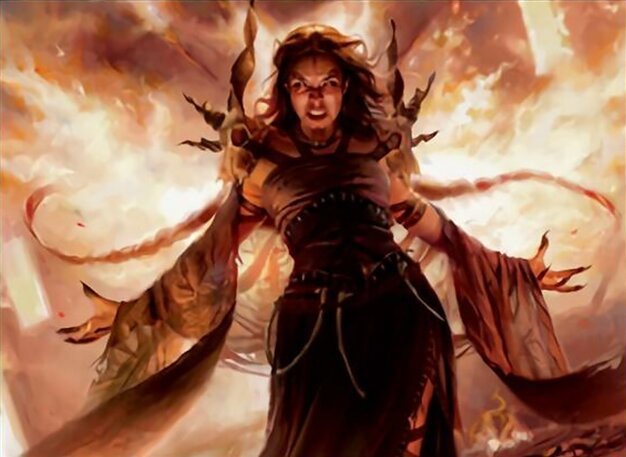Every Magic player has their personal preferences.
Be it the colors, the format, the playstyle, the creature, the commander, the wincondition, the archetype, among others. These preferences are an essential part of the game and part of what makes Magic such a broad, complex, and fun game.
Players identify themselves with cards, strategies, decks, among other things and end up creating, from that point, their own personal expression based on the cards and the game itself.
This is so natural when you play the game often or for a long time that even the most competitive players, known as Spikes, have their own personal preferences even when the most obvious option for them is usually "play the best deck in the format" they have a particular preference about which archetype or deck they have fun or enjoy playing.
Ad
In my particular case, I have a preference for Tempo decks, that is, decks that tries to use 1-for-1 disruptions and favorable exchanges against their opponent such as removals and counters, which are commonly seen in Control or Midrange decks as well.
What differentiates Tempo from these decks is that, rather than trying to use these cards to extend the game and then drop their bombs and stabilize the game, Tempo decks use these resources to speed up the clock presented by their low-cost threats or to ensure you can play them with the security of protecting them.
Obviously, this is not exclusive to Tempo decks and the concept of Tempo goes well beyond just decks.
In fact, there are many people who believe that the term Tempo deck should not even be applied as an archetype. But there is a certain deck within this category that is a much better reference to define them: Delver Decks.
In a general context, the way Delver decks are used to constantly transition between proactive and reactive plays makes this category of deck extremely challenging to pilot, but very rewarding when piloted the right way.
Understanding when you need to be the beatdown, when you need to respond to what your opponent is playing, when to protect your threats, among other things, makes these decks a great experience for its players,
Whether to get good results or to improve your experience and understanding of the game or a specific format.
When it comes to formats, despite not being a format that I actively play (especially due to the price tag of its staples), Legacy is one of my favorite formats to play and watch due to the significant amount of powerful cards and impactful interactions existing in the format.
There is no other format with a great player base where you can play with Force of Will, Wasteland, powerful cantrips like Brainstorm and Ponder, and other powerful spells from other archetypes such as Hogaak, Arisen Necropolis, Ancient Tomb, Green Sun's Zenith, among others.
Because of that, I see Legacy as one of the most exciting formats to play, as it's about having meaningful access to the best cards in the entire game and making the best use of them. And the icing on the cake is that Delver, my favorite archetype, is the best deck of the format.
Or rather, Delver is the “fun police” of the format, the deck that manages to hold the unfair decks while playing well against the fair decks, and thus became the best archetype of the Legacy Metagame in the last eight years, losing this spot only when a truly broken deck appears in the format, when the broken deck is not a variant of Delver itself using one or another unfair card.
After all, Legacy is a format with infinite interactions, and it's impossible to keep track of all of them when creating a new card for a new set. It's also not possible to understand the full potential of a card before its release, before the collective mind of the community does its job of trying to break formats with each new release.
Ad
With Modern Horizons II, Izzet Delver gained new additions and made excellent results this weekend, and I couldn't resist the urge to test the new version of the deck this week and consequently prepare an informative tech deck for you to learn more about the current best deck of the format.
Without further ado, I present to you the new Izzet Delver:
This was the list used by player stainerson to win the Legacy Showcase Challenge this weekend, using a total of eleven new Modern Horizons cards, all of which are of great use for the archetype.
The objective of Izzet Delver, like the other variants of the archetype, is to play a low-cost threat or two and keep them in play while trying to disrupt the opponent's plans with low-cost disruptions like counters and removals.
Each Delver variant has its pros and cons, but Modern Horizons II brought in enough cards that the Izzet version can easily be considered the best version due to the consistency of threats the deck now has, which has surpassed the creatures of the Temur version, along with a more robust manabase, less susceptible to cards like Wasteland.
Another advantage of the Izzet version is the ability to consistently play Expressive Iteration, which proved to be a strong card within all formats in which it is legal as a great way to obtain selection card and card advantage at a low cost.
That said, I think we must dissect the deck to understand exactly how it works, and how it got straight to the top of the format:
Maindeck

Every player from Legacy, Pauper, or any player who has played the 2012 Standard knows how powerful Delver of Secrets is.
The card that became a staple of the format allows the deck to have aggressive openings with a 3/2 body with evasion, which represents a clock of seven turns if the opponent can't answer it or get around it, something that is very complicated to do when you manage to spend the rest of the game responding to what they play and removing their threats.
Dragon's Rage Channeler or “the Red Delver,” as I've fondly dubbed it, may be harder to transform into a 3/3 Flying, but the Surveil ability and the quality of the cards you use, plus the threats that need to be answered immediately in the deck, makes enabling it, even on lists without Mishra's Bauble, easier than it looks.
Also, Dragon's Rage Channeler interacts very well with the rest of the deck due to Surveil, which can be used in several ways: either to take the bad top cards you left with a cantrip, or to make sure that your Delver will transform when responding to his ability with a removal, among other options.
Finally, Ragavan, Nimble Pilferer, a card that the opponent should try to answer at any cost early in the game, whether with blockers, counters or removals.
Ragavan is exactly what people expected him to be in Legacy: If he stays on the board and isn't blocked, the albino monkey will generate an absurd amount of card and mana advantage every turn.
Ad
First because Legacy is a format where cards tend to be very efficient in terms of mana cost, and therefore it is easy for you to even play cards of other colors with Ragavan because of the Treasure token it produces. And even if you don't and/or aren't interested in playing the revealed card, the Treasure produced is a huge advantage in a deck that uses so many low-cost cards.
Thus, in many ways, Ragavan really reminds of Deathrite Shaman in that he always threatens to generate a significant amount of value and mana since turn 1 and can simply dominate the game if the opponent doesn't interact.

One of the advantages that always existed in the splash of green or black was the possibility of having a threat capable of ending the game in a few turns and with a body that was not so vulnerable to Lightning Bolt.
Green has Tarmogoyf and Hooting Mandrils, black has Gurmag Angler and its predecessor, Tombstalker. And now blue has Murktide Regent.
There are many comparisons between this card and Ethereal Forger, and while I consider these comparisons fair, Murktide Regent has a clock speeding function, commonly being a 6/6 or stronger in the mid or late- game and demands a lot more work for the opponent to deal with than Ethereal Forager, which would commonly be used as an advantage card engine.

One of the reasons Delver of Secrets is so strong on Legacy but can't reproduce the same results on Modern is because of the cantrips.
While Modern makes it necessary to settle with cards like Serum Visions and Opt, Legacy has the best of the best cantrips available in the game.
Brainstorm is, although it doesn't seem like, one of the most complex cards to play in Magic history and has its full potential in Legacy, where it interacts with Fetchlands, other quality cantrips, serves to protect your spells from discard effects (which are currently not that common in Legacy) and opens up numerous decision trees regarding which cards to keep, when to use, etc.
Ponder is potentially the second-best cantrip in Legacy, interacts very well with Brainstorm by clearing the top's useless cards, and looks at more cards than other options like Preordain.
Expressive Iteration works much like a “draw two cards and throw a useless card to the bottom” for two mana as you'll commonly play the exiled card with it in the same turn. It's important to point out that you should always prioritize putting the reactive card in your hand and the proactive card in exile, otherwise you'll only be “drawing” a card for two mana.

Your pack of free counters against the unfair decks, and they are also the cards that allow the deck to play efficiently and proactively early in the game.
Daze is a powerful card within Legacy, where mana needs to be used efficiently, and the fact that the deck uses Wasteland further maximizes its value.
Ad
Force of Will is often a safety valve against unfair decks and combo decks, but it also works as a great way to protect your creatures against punctual cards at certain stages of the game.
Force of Negation basically works with the same nature as Force of Will, but with the advantage of being easier to hardcast, unlike the previous card.

Its pack of removals, which also serve to speed up the clock against the opponent in non-interactive matchups.
Lightning Bolt is the best at what it does. There's not much to say about it.
Forked Bolt is a great meta-call for a format where you expect the mirror match to be frequent. The ability to kill two creatures for one mana is relevant enough right now. The card is also very useful against Elves, Death & Taxes, among other archetypes with small creatures.

Wasteland is technically essential to any proactive Legacy deck, as it is one of the most effective means of delaying an opponent's plan and a card they need to respect significantly when considering their land drops.
Wasteland is basically a crucial disruptive element in delaying the opponent's plays and also makes cards like Daze relevant for more turns.

A classic fetch and dual base. You always want more fetchs than duals or basic lands because of the many interactions between them and your cantrips.
3 Volcanic Island seems like the right number for a deck that doesn't have a greedy manabase and tries to benefit from not giving too much room to the opponent's Wasteland.

Basic lands are great to play around Wasteland, Blood Moon, Back to Basics, etc.
Particularly, I would exchange them for snow basic lands. Merely because there is no cost to do so and it is beneficial if you exile cards like Ice-Fang Coatl or On Thin Ice with Ragavan.
Sideboard

Your anti-Delver (and anti-Blue) package
Pyroblast is actually a multi-purpose card in Legacy as the format is mostly defined by blue decks and its inclusion is a great answer for many options. From Delver of Secrets to Uro, Titan of Nature's Wrath, going through a multitude of matchups where this card has a valid target.
Blazing Volley is a cheap and efficient answer for the mirror, as it can handle multiple copies of the X/1 creatures the deck currently uses. The card is also effective against Elves and Death & Taxes.

With Affinity's significant growth in the format, the popularization of Urza's Saga and the fact that one of Delver's worst matches are Prison decks that runs Chalice of The Void and Trinisphere, artifact hate spells are needed.
Abrade doubles as flexible removal against creature decks while also serving to respond to artifacts the opponent uses.
Ad
Meltdown and Null Rod become very relevant options as Affinity grows, as these can destroy multiple artifacts with just one spell and are very effective against artifact lands, as Null Rod makes it impossible for even mana abilities to be used and a Meltdown to 0 essentially destroys all artifact lands on the opponent's board.

Graveyard decks have always been in the format and remain very viable options for Legacy, and respecting them is necessary. Especially when one of Delver's worst matches is Hogaak.
Surgical Extraction is still one of the best answers against both graveyard and decks with specific combos in Magic. The ability to cast an exile effect that can essentially lock a combo out or remove a major threat from the opponent's graveyard for free pretty much trumps the rest of the options in the game today.
Grafdigger's Cage is a more dedicated hate that prevents creatures from entering the battlefield from graveyards. The artifact is also useful against decks that use Green Sun’s Zenith.

Submerge is a good answer for problematic creatures that commonly win the game on their own, such as Hogaak, Arisen Necropolis, Uro, Titan of Nature's Wrath or Elvish Reclaimer (which tutor Dark Depths and Thespian's Stage), and also serves as an answer to creatures that will commonly create a higher clock than yours or effectively block your creatures well like Tarmogoyf.

Finally, one of the weaknesses of the deck is that, despite having several disruptive cards and even ways to accumulate card advantage with Ragavan, Nimble Pilferer or Expressive Iteration, it suffers significantly when the opponent manages to slow down its clock, mostly with Uro, Titan of Nature's Wrath.
Sulfuric Vortex is a card that helps against this plan as it impedes lifegain and is also a difficult permanent to remove for many decks while dealing a constant source of damage to the opponent.
Performance Analysis
First, this deck is spectacular and pretty fun to play. It captures the very essence of what a deck with Delver of Secrets aspires to be and adds consistency and value thanks to new cards, creating a true game-winning machine.
I played several matches in Tournament Practice, until I got to the point where I felt safe enough to play a League with that list.
That done, I ended the League as follows:
2-0 vs. Burn
2-1 vs. GW Depths
2-1 vs. Izzet Delver
1-2 vs. Bant Snow
2-0 vs. Show And Tell
I finished the league with a result of 4-1.
One particular feeling I had while piloting the deck is that it seems to be a step above the other decks in the format, or that the metagame still feels unprepared for it.
I say this mainly because I'm not familiar with Legacy and haven't played the format actively since 2018, and yet I managed to get very positive results with the deck, even when making occasional embarrassing mistakes, such as putting a Daze on exile and Delver of Secrets in hand with Expressive Iteration or sequencing the wrong top with Ponder in a game.
Ad
Delver is not a deck that tends to be very permissive with misplays and small mistakes, and it's precisely this aspect that makes the archetype so fascinating, but when you have cards that are significantly more powerful than your opponent's, your margin for error becomes less punitive because your cards generate so much value that you will win the game even if you make mistakes.
And that's where Ragavan comes in.
Ragavan, Nimble Pilferer is by far the most powerful card Modern Horizons II has brought Legacy and is probably the most powerful card the format has received since Oko, Thief of Crowns.
It's your perfect turn 1 play, ideally with a backup of Daze or some removal to deal with what your opponent plays and, from there, start accumulating value every turn.
In addition, the Dash ability allows you to create multiple gaps and openings to use it and gain value in the same turn, which is important in games where you need to play reactively, or when your opponent is forced to spend their resources dealing with your other threats. There have been several games where my focus was just keeping Ragavan alive or the opponent's board empty, so I could attack with him using Dash and win the game with the mana and permanents he gave me.
The only time I felt really on par against the opponent was in games where the opponent could keep an Uro, Titan of Nature's Wrath on the board, as Uro is a significantly larger creature than Ragavan and generates more value than the albino monkey itself, despite being played many turns later.
Other than that, it always seemed like leaving a Ragavan on the board or topdecking a Ragavan on an empty table would take the game on its own and I didn't even have to worry too much about letting the opponent spend resources on my other creatures, as long as they couldn't deal with him. The treasures he produces are pure mana advantage and there are many occasions where this allows absolutely explosive plays or even speeding up the threat that will close the game in the form of Murktide Regent.
Speaking of Murktide Regent, although it seems counterproductive, there are several occasions where you use the Dragon's Rage Channeler ability to increase the number of cards in your Graveyard to play it faster, giving you a significant advantage in matches where you need to establish a race or clock fast enough not to allow the opponent to stabilize.
Dragon's Rage Channeler, by the way, has always seemed like an unexciting threat in the early game, but has always proved to be one of the best topdecks in terms of threats the deck could have, even ahead of Delver of Secrets on many occasions for the mere fact of not needing any other setup to work.
That said, Izzet Delver's core was already well-recognized in Legacy, and it's no surprise that this deck has done so well in the last week, and the additions of Modern Horizons II have taken the deck to a brand-new level.
The question remains whether this deck, which was a variant of the best deck in the format since before the set, will become overwhelming for the Metagame, as it was during the period when Legacy had Wrenn & Six, or if the format will adapt and create ways to better interact with the new cards.
Ad
Another point to consider is whether decks that commonly prey on Izzet Delver will continue to do a good job or will have difficulty keeping up with the consistency in threats and value that Modern Horizons II has added to the deck.
As for changes I would make to the deck: particularly, I'm no Legacy expert to be able to dictate how lists should be used, and this list definitely has its proven result, but adding snow basic lands instead of common basics opens up some interesting little possibilities with Ragavan and certain cards that care about snow permanents, so I would consider making this switch since it's not like anyone is using Reidane, God of Worthy in Legacy to lock snow lands.
Another option to consider, and which players have already tried, is the inclusion of Mishra's Bauble in the lists, as this card makes it easier to reach the Delirium, it is a free cantrip that has several interesting interactions with Fetchlands. However, the deck is fine with this build and I can't really define whether it would be beneficial to weaken Delver or Murktide Regent and even Force of Will in exchange for strengthening Dragon's Rage Channeler.
Conclusion
This was my deck tech for Legacy's Izzet Delver, which currently presents itself as the best deck of the format.
Modern Horizons II arrived in all eternal formats with both feet in the door, creating significant Metagame changes for all of them and proving to be just as impactful as its predecessor. It wouldn't surprise me if the set on its own significantly changed the way decks are built to handle the cards included in it as good as possible.
Let's just see now whether the formats can adapt to the changes, or whether direct interventions will be needed in the coming months to regulate the metagame if these cards prove too strong for their respective formats.
Thanks for reading!







— Comments0
Be the first to comment